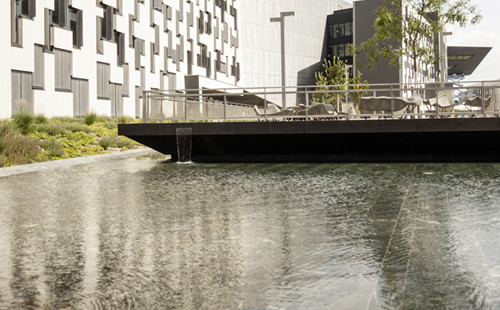What does excellent teaching in International Political Economy look like?
Prof. Jonas Bunte, head of our institute at WU Vienna, shares his unique approach to teaching International Political Economy.
In 2024 the head of our institute, Prof. Jonas Bunte, has been awarded the WU Vienna Award for Excellence in Teaching. The main part of this event was the exhibition "The Art of Teaching" - a poster was created for each award winner, depicting their very special approach to excellent teaching.
In the following interview, Prof. Jonas Bunte's shares his approach - combining thinking, doing, and character skills to prepare students not just to understand the world, but to actively shape it.
What characterises your teaching?
A central concern of my teaching is the development of three core competencies that enable students to understand the world more comprehensively and actively shape it.
The first pillar, Thinking Skills, promotes the formulation of precise questions to develop several competing explanatory approaches and weigh them against each other.
The Doing Skills emphasise the importance of media competence and teamwork. This is about developing new hypotheses and implementing them, which requires a collaborative and communicative approach. It includes communicating content via different media types and to various target groups.
The third pillar, Character Skills, deals with uncertainty and challenges. It promotes resilience and teaches people to leave their comfort zones and remain capable of making decisions even in the face of incomplete information.
I use the topics and content of International Political Economy, including in the specialisation “Politics and Money”, to achieve this. In my personal interactions with students, I strive for a balance between accessibility and motivation on the one hand and encouragement and challenge on the other.
What has been your most important key learning in activating students so far?
The most important thing is to take students seriously. It is always important to me to meet the students where they are. This involves two components:
Firstly, in terms of pedagogy, it is important to me to explain at the beginning of a course why I teach in a certain way. Much of what I practice may seem unconventional and outside of students' previous experiences. However, extensive research exists in the field of Scholarship of Teaching and Learning (SOTL). Concerning research findings, I strive to show students that the approaches used in my courses are effective.
Secondly, I try to show the relevance of the skills and content to their future. Why do my courses focus on formulating explanations for issues and developing the ability to assess the quality of competing arguments?
The reason is simple: There are often no clear-cut answers regarding right and wrong in the tension between politics and economics. However, this does not mean that all arguments are equally valid. Some arguments are more convincing if their logical mechanisms are conclusive and the empirical evidence gives them an advantage.
Nevertheless, it is a challenge to evaluate arguments and empirical information appropriately and rationally. Many students pursue careers in fields where there are rarely clear-cut answers. As a lecturer in International Political Economy, I have the opportunity to help students develop the skills required for such fields.
What methods do you use to encourage oral participation?
In terms of content, I focus mainly on topicality and incorporating my students' diverse backgrounds. Each course unit includes several current newspaper articles that directly link the subject matter to real current events. This highlights the relevance of what is being taught and encourages lively discussions.
I also encourage students to bring in their perspectives. As a business university, we have a diverse and talented student body, so we can benefit from each other's experiences. I also rely on a combination of technical innovations and contemporary media.
During lessons, I use technology that allows students to ask questions without necessarily having to raise their hands. In addition, I integrate small surveys to capture immediate feedback and different opinions. Each unit has at least one case study in which students must analyse a current situation from various perspectives.
Humor is also an important part of my methodology; I like to use memes to make complex topics tangible and entertaining. I also use modern media formats such as TikTok and podcasts to present the material in a lively and appealing way. Interested readers can find more examples on our IPE@WU Shorts series.
What has helped you the most in your teaching career?
For one, it was the opportunity to receive extensive pedagogical training at the University of Minnesota during my doctoral studies. These courses and workshops opened my eyes to the many possibilities in teaching.
Second, I conduct my own research and publish in the area of Scholarship of Teaching and Learning. Studying this literature provides me with much inspiration. Finally, I am convinced I can also learn much from my students. By actively soliciting feedback and taking it seriously, I gain valuable data to learn what works well in my courses and where there is room for improvement.
Curious to learn more? Visit our Teaching page to learn about our course offerings, specialisation and teaching philisophy.
Sign up for our mailing list for regular updates from the Institute. You can find the subscription form here: Subscribe to the newsletter
